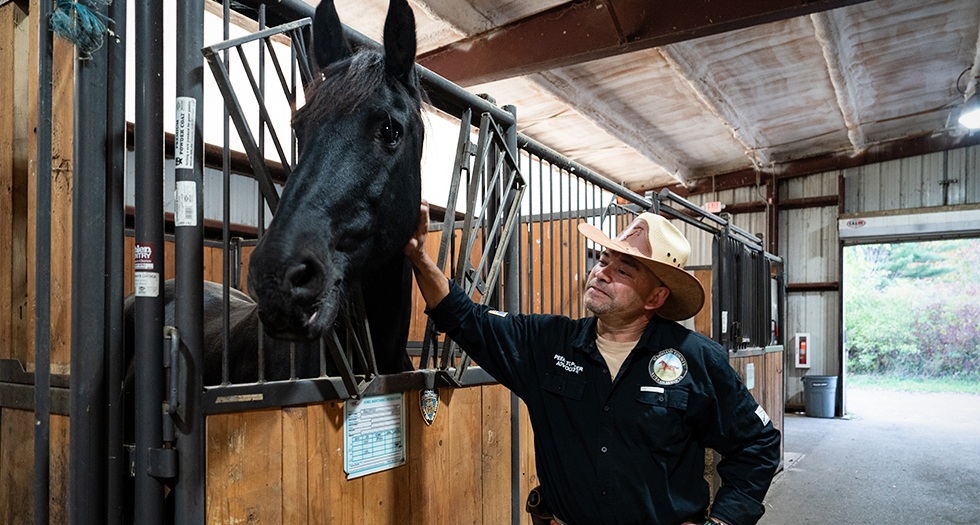
American Legion service officer expands her office, adds recreational opportunities, horse equine program and more to help veterans heal.
About five years ago, Army veteran Adam Halloran began treatment for substance abuse and rehabilitation, as well as behavioral issues, at the VA medical center in Albany, N.Y.
“There were a long line of things that needed to be addressed,” he recalled. “I checked myself in, for about six weeks. They tried to help me out and give me time to recover and a soft place to land. I was suffering with mental illness, in a crisis, suffering with drug abuse and alcohol abuse, and a long line of family PTSD and from the Army itself.”
Upon his release he met Mona, who was exactly what he needed to stay on the right path. She is beautiful, caring and a good listener.
Mona is a horse.
She is among the horses at the equine therapy program at the State University of New York (SUNY) Cobleskill, led by Kris Hofeller. Eilene Fisher, an accredited American Legion service officer for Schoharie County, hired Hofeller — a retired Army Ranger — to run the equine program as her office’s veterans peer-to-peer advocate.
Schoharie County is a rural community, at the base of the Catskill Mountains in eastern New York. The area’s recreational opportunities like hunting, fishing and hiking draw veterans to the community.
In addition to the weekly equine therapy program, Hofeller executes retreats for veterans who are dealing with mental-health issues. More than 3,300 have participated in caving expeditions, fishing and kayaking trips, snowshoeing, hiking, airsoft games and other adventures.
The equine therapy program methodically bonds the veteran with a horse. It starts with grooming and then progresses into riding the horse inside a covered arena with instructors helping out.
“The horses don't judge and they work off your feelings,” Hofeller explained. “They don't have expressions, but you can see when they're thinking because they're licking their lips. They have an energy, and it's amazing. It's really magical. When they accept you, they'll follow you.”
Since becoming Schoharie County’s accredited American Legion service officer in 2008, Fisher has helped thousands of veterans with their benefits claims. She’s part of the American Legion network of service officers that completed fiscal year 2024 with a record-breaking $21 billion in benefits claims for disabled veterans.
“I feel blessed I'm able to do this job, that I'm able to share what I've learned with the American Legion training,” said Fisher, who is also adjutant of Post 248 in Middleburgh. “I'm just thankful that I can do this and have the ability to do this. Now I'm teaching my new VSO that you've got to have passion, and you've got to have empathy. I lose my vets to cancer and to suicide. It’s not an easy job to do. But it's the best damn job because you're making a difference in somebody's life.”
For Fisher, a medically retired Army veteran, it’s a way to give back.
“What drives me to come in?” she said. “The camaraderie I get with the veterans, the, ability to help them. it's not about the money. You earned this. You served your country. You raised your right hand. And then you got sick or you got hurt. Now the government needs to say, ‘Here, this is for you because you got sick or hurt and you can't do whatever you should be doing anymore.’ Let me help you get what you deserve and, make your life better.”
In the past 16 years Fisher has also expanded her office, including adding the equine therapy program, where veterans like Halloran can heal from their PTSD. It’s an extension of how her office serves the veterans population.
Halloran is among the successes of the program. He is enrolled in the SUNY school’s therapeutic horsemanship program and gives back as an intern, helping his fellow veterans.
“I've always had an issue giving people hugs,” he said. “People always hugged me. These horses can be a stable platform for me to put my 260 pounds on their neck. Getting a hug from a horse is calming. This horse (Mona) has become ‘family,’ but it's more than that. We're a soul family.”
After he earns his degree, Halloran envisions helping others heal.
“I want to help other people, help other veterans, volunteer my time,” he said. “I've been fortunate that the military takes care of me so I can be a partial stay at home dad. At the same time, I can be a horseman, a cowboy. My whole dream is to just ride. I have the ability to work with horses, help people heal, and it's not even me. It's the horse.”
- Veterans Healthcare

